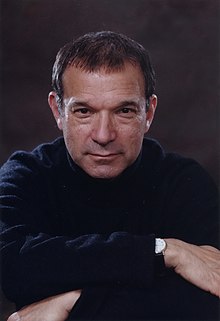Stephen Greenblatt
| Stephen Greenblatt | |
|---|---|

Stephen Greenblatt in 2004.
|
|
| Born | Stephen Jay Greenblatt November 7, 1943 Boston, Massachusetts |
| Occupation | Writer, professor at Harvard University |
| Language | English |
| Nationality | American |
| Education | Newton North High School |
| Alma mater | Yale University |
| Subject | New Historicism, Shakespeare, Renaissance |
| Notable awards | National Book Award for Nonfiction |
| Spouse | Ellen Schmidt (1969–1996) Ramie Targoff (1998–) |
Stephen Jay Greenblatt (born November 7, 1943) is an American Shakespearean, literary historian, and Pulitzer Prize-winning author. He is John Cogan University Professor of the Humanities at Harvard University. He is the general editor of the The Norton Shakespeare (2015) and the general editor and a contributor to The Norton Anthology of English Literature.
Greenblatt is one of the founders of New Historicism, a set of critical practices that he often refers to as "cultural poetics"; his works have been influential since the early 1980s when he introduced the term. Greenblatt has written and edited numerous books and articles relevant to New Historicism, the study of culture, Renaissance studies and Shakespeare studies and is considered to be an expert in these fields. He is also co-founder of the literary-cultural journal Representations, which often publishes articles by new historicists. His most popular work is Will in the World, a biography of Shakespeare that was on the New York Times Best Seller List for nine weeks. He won the Pulitzer Prize for General Non-Fiction in 2012 and the National Book Award for Nonfiction in 2011 for The Swerve: How the World Became Modern.
Greenblatt was born in Boston and raised in Newton, Massachusetts. After graduating from Newton North High School, he was educated at Yale University (BA 1964, M.Phil 1968, PhD 1969) and Pembroke College, Cambridge (BA 1966, with the standard promotion to MA in 1968). Greenblatt has since taught at the University of California, Berkeley, and Harvard University. He was Class of 1972 Professor at Berkeley (becoming a full professor in 1980) and taught there for 28 years before taking a position at Harvard University. He was named John Cogan University Professor of the Humanities in 2000. Greenblatt is considered "a key figure in the shift from literary to cultural poetics and from textual to contextual interpretation in U.S. English departments in the 1980s and 1990s."
...
Wikipedia
